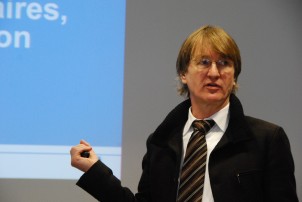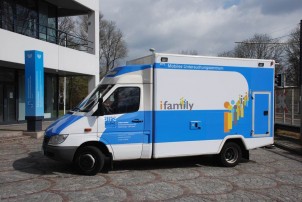Does The Family Play A Key Role In Helping ‘Tweens’ Maintain A Healthy Weight?
The EC funded IDEFICS study has shown that children under the age of 10 who regularly eat in a family unit, have fun within a structured home environment, and have a sense of well-being reduce their risk of becoming overweight or obese by 50%.
These significant findings from the EC funded IDEFICS Study concerning the importance of family life are reported today (18 October 2012) at the European Childhood Obesity Group (ECOG) Congress in Palma de Majorca.
But does this continue once children enter the ‘tween’ years – neither a child nor yet a teenager – a period when more external influences come into play? This is one of the key questions being followed up in the I Family study.
Iris Pigeot, Deputy Co-ordinator of both IDEFICS and I Family (Professor of Biometry and Epidemiological Methods at BIPS – Institute for Epidemiology and Prevention Research, Bremen, Germany) says today at ECOG: “Children below the age of 10 remaining engaged with family life, particularly eating as a family unit, and with a sense of well-being reduce their risk of becoming overweight and obese by 50%. Their experience of a supportive and warm family environment is also key to maintaining a healthy weight.”
“This striking and significant effect is confirmed in our IDEFICS data based on a cohort of 16,000 children across 8 European countries.”
“What we will do now in the I Family study tracking that IDEFICS cohort,” continues Pigeot, “is to see how far the role of the supportive family continues to have this significant effect as children become ‘tweens’, whether this role is taken over by a child’s peer group, or whether other factors such as built environment have an increased impact.”
“The IDEFICS study demonstrated clearly that a child’s emotional well-being, their self-esteem, relationships within the family unit and social contacts are key elements to maintaining a healthy weight. I Family will attempt to determine how far the role of the family unit is one of the critical factors – or indeed the critical factor – in supporting European ’Tweens’ to combat obesity.”
ENDS/ Notes follow
Available for interview – Deputy Project Co-ordinator Professor Iris Pigeot
Contact Rhonda Smith of Minerva on +44(0)7887-714957 to arrange and for further media information
Notes for Editors:
1. The I Family Study is an EC funded project under Framework 7 of the KBBE programme running from March 2012 to February 2017. It has 17 partners, working across 11 countries and with cohorts in 8 European countries – Germany, Italy, Sweden, Hungary, Cyprus, Estonia, Spain and Belgium.
2. The study has two strategic objectives:
i. to understand the interplay between barriers against and drivers towards healthy food choice
ii. to develop and disseminate strategies to induce changes that promote healthy dietary behaviour in European consumers especially adolescents and their parents.
3. The I Family Study is re-assessing the families first engaged with the IDEFICS study when children were below 10 years of age now that they move into adolescence – the ‘tween’ years – identifying those families that have adopted a healthy approach to food and eating habits and those that have not. I Family is adopting a holistic approach by also investigating the biological, behavioural, social and environmental factors that drive dietary behaviour as children journey towards adulthood.
4. I Family partners
| Participant organisation | Lead investigator(s) | Key responsibilities |
| University of Bremen, Germany | Wolfgang Ahrens | Project coordinator |
| BIPS – Institute for Epidemiology and Prevention Research GmbH, Germany | Iris Pigeot | German cohort, statistics |
| Institute of Food Sciences, National Research Council, Italy | Alfonso Siani | Italian cohort, nutritional epidemiology |
| Copenhagen Business School, Denmark | Lucia Reisch, Wencke Gwozdz |
Consumer behaviour & environmental influences |
| University of Lancaster, United Kingdom | Garrath Williams | Ethics, policy, and stakeholder engagement |
| Sahlgrenska Academy at the University of Gothenburg, Sweden | Staffan Mårild, Lauren Lissner |
Swedish cohort, family analysis |
| University of Helsinki, Finland | Jaakko Kaprio | Familial aggregation & genetic modelling |
| University of the Baleares Islands, Spain | Andreu Palou, Catalina Picó |
Genomic analysis |
| University of Pécs, Hungary | Dénes Molnár | Hungarian cohort |
| Rudolf Magnus Institute of Neuroscience, The Netherlands | Roger Adan | Neuroimaging & neuropsychology |
| Research and Education Institute of Child Health, Cyprus | Michael Tornaritis | Cypriot cohort |
| National Institute for Health Development, Estonia | Toomas Veidebaum | Estonian cohort |
| Fondazione IRCCS Istituto Nazionale Tumori, Italy | Vittorio Krogh | Dietary assessment methods |
| University of Bristol, United Kingdom | Angie Page, Ashley Cooper |
Physical activity monitoring |
| Minerva PRC Ltd, United Kingdom | Rhonda Smith, Marc Catchpole |
Dissemination and communication |
| University of Zaragoza, Spain | Luis Moreno | Spanish cohort |
| Ghent University, Belgium | Stefaan De Henauw | Belgian cohort |







